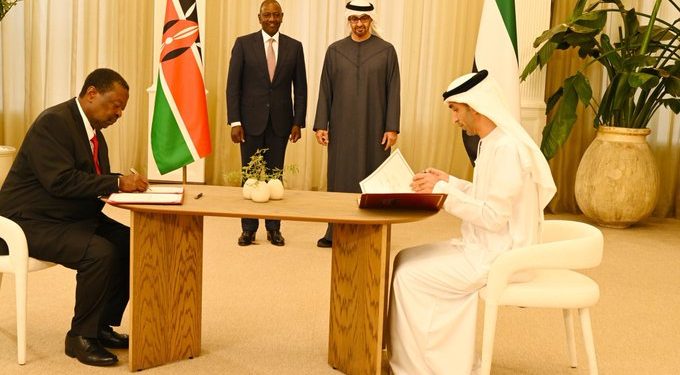The Kenya-UAE trade deal is slated to ramp up trade between the two countries, and could present an opportunity to dislodge China as the primary source of Kenya’s imports.
- The deal, signed yesterday by President William Ruto in Abu Dhabi, UAE, is set to eliminate barriers and open up more markets for Kenyan exports such as horticultural and meat products.
- In turn, Kenya will also double its imports from UAE, which include petroleum, machinery, and chemicals – some of which China has traditionally supplied in bulk.
- The government reported that trade between the two countries hit KSh 445 billion in 2023 and the Middle Eastern country became Kenya’s sixth-largest export destination.
“Kenya has become Africa’s gateway to the world, with duty-free, quota-free access to global markets representing nearly half of the world’s GDP,” the presidency said in a statement.
Abu Dhabi Bets Big
Imports from the UAE dipped in the months between July and September last year, according to data from KNBS, to KSh 88.9 billion from KSh 90.9 billion in the preceding quarter. Meanwhile, China’s imports rose to KSh 170 billion in the third quarter up from KSh 132 billion.
On the export side, however, UAE outpaced China as a major importer of Kenyan produce. Although the UAE value slumped in the third quarter to KSh 27 billion from KSh 37 billion the previous quarter, China role as an export destination dropped even more significantly from KSh 8.5 billion to KSh 4.9 billion.
UAE’s trade deal with Kenya is the first of its kind with an African nation, as the Gulf country seeks leverage to entrench its economic presence in a continent oscillating between Chinese and Western trade, which tends to be one-sided. Emirati companies pledged investments worth US$110 billion in African projects, a bulk of it staked in renewable energy, according to data from the Financial Times.
As many countries in West Africa realign their interest from traditional financiers like France and the US, the UAE intends to rival China – which has also been criticised for bogging down the continent with ‘high debt burdens’ and flooding markets with cheap imports-across the continent. Kenya has pursued opportunities for this intensified focus by Abu Dhabi since 2022.
The Bigger Picture
Nairobi will heap the UAE deal on a stack of other trade pacts it has made globally. These include the Kenya-UK Economic Partnership Agreement, the African Continental Free Trade Area (AfCFTA), and the African Growth and Opportunity Act (AGOA) with the US.
The Comprehensive Economic Partnership Agreement (CEPA) deal will not only be crucial for both countries’ tangible industries, but also open up opportunities for Foreign Direct Investment (FDI) in the services’ sector.
The deal is part of a wider strategic shift among Gulf countries to prepare for a post-oil economic future. In addition to Kenya, the UAE also signed deals with New Zealand and Malaysia.




